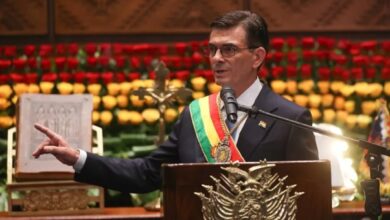Bolivia’s Break with Israel: A Diplomatic Misstep in a Complex Conflict
Bolivia's recent decision to sever diplomatic ties with Israel, citing the "aggressive and disproportionate military offensive" in the Gaza Strip, is a controversial move that warrants a deeper examination. In the complex geopolitical arena where Israeli-Palestinian relations play a crucial role, this decision might be considered a misstep for Bolivia.

Photo: EFE/Javier Mamani (Edit: LatamPost)
The Latin American Post Staff
Escucha este artículo
Leer en español: La ruptura de Bolivia con Israel: un paso en falso diplomático en un conflicto complejo
Bolivia's Bold Diplomatic Move
Bolivia's announcement to cut diplomatic relations with Israel is a bold statement in international politics, reflecting deep moral convictions. However, it's essential to consider the broader implications of such a decision, especially in the context of the intricate Israeli-Palestinian conflict and the regional significance of Israel.
The vice-chancellor, Freddy Mamani Machaca, justified this move as a response to what Bolivia perceives as an excessively harsh Israeli military action in Gaza. While the desire to stand against perceived injustice is commendable, international diplomacy demands a nuanced understanding of conflicts, especially those as enduring and complex as the Israeli-Palestinian issue.
Potential Costs of Disengagement
Bolivia's stance is more of a symbolic gesture, echoing former President Evo Morales' actions in 2009. However, this decision risks overlooking the strategic importance of Israel in Latin America and globally. Israel has been a crucial player in various technological, agricultural, and security sectors, contributing significantly to global innovation and cooperation. Bolivia's disengagement might close doors to beneficial partnerships, potentially isolating the country from significant technological and economic advancements.
Moreover, Bolivia's unilateral action in cutting ties with Israel seems to disregard the multifaceted nature of the conflict. The Israeli-Palestinian dispute is deeply rooted in historical, religious, and political dimensions, where both parties have legitimate claims and grievances. By choosing to sever relations solely based on Israel's actions in Gaza, Bolivia might inadvertently appear biased, overlooking the complexities of the situation, including the roles and responsibilities of other actors in the region.
Empathy Without Exclusivity
Indeed, the plight of Palestinians, particularly in the Gaza Strip, is heart-wrenching, and Bolivia's empathy towards them is understandable. The Palestinian struggle for statehood and recognition, amid ongoing issues like settlements, blockades, and periodic violence, calls for international attention and resolution. However, acknowledging this shouldn't preclude recognizing Israel's security concerns and its right to defend itself against militant threats, a reality often faced by the nation.
Furthermore, Bolivia's decision might need to be revised to pursue a peaceful resolution. Engaging in dialogue and maintaining diplomatic relations are pivotal in influencing peace processes. Diplomacy provides a platform for mediation, understanding, and conflict resolution. By breaking off ties, Bolivia potentially loses its leverage to advocate for Palestinian rights and a peaceful solution to the conflict.
A Call for Inclusive Engagement
The Israeli-Palestinian conflict requires concerted international efforts to pursue a two-state solution where both Israel and Palestine can coexist peacefully. Bolivia's call for a "definitive solution" and the right for Palestinian self-determination, expressed by President Luis Arce, aligns with this perspective. However, achieving such a goal necessitates engagement, not estrangement, with both parties involved.
Additionally, Bolivia's decision comes at a time when several Arab countries are normalizing relations with Israel, recognizing the benefits of engagement over isolation. These nations, while sympathetic to the Palestinian cause, also acknowledge the importance of collaboration with Israel for regional stability, economic development, and security. Bolivia's move, therefore, seems out of step with a growing trend that favors dialogue and connection.
Also read: Analysis: A Look At The Palestinian-Israeli Conflict From Latin America
The Path Forward
In conclusion, while Bolivia's decision to sever diplomatic relations with Israel might resonate with a moral standpoint against what it views as aggressive military actions in Gaza, it raises questions about the practicalities of international diplomacy and conflict resolution. Given the complex and multilayered nature of the Israeli-Palestinian conflict, a more balanced approach that involves engagement and dialogue with all parties would likely be more effective. Bolivia's move, though symbolic, might not only hinder its international standing and opportunities for development but also reduce its ability to contribute meaningfully to a peaceful resolution in the Middle East. For a conflict as enduring and challenging as this, active engagement, rather than disengagement, might hold the key to progress.





